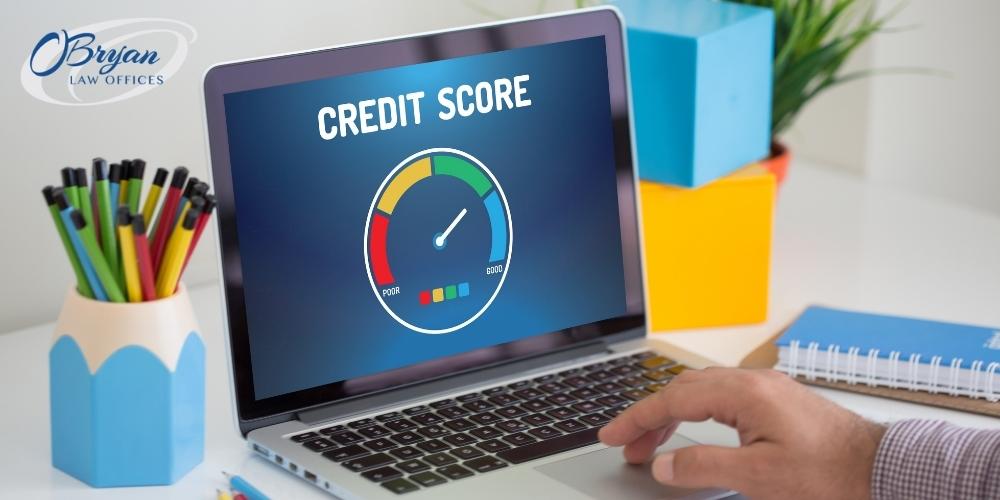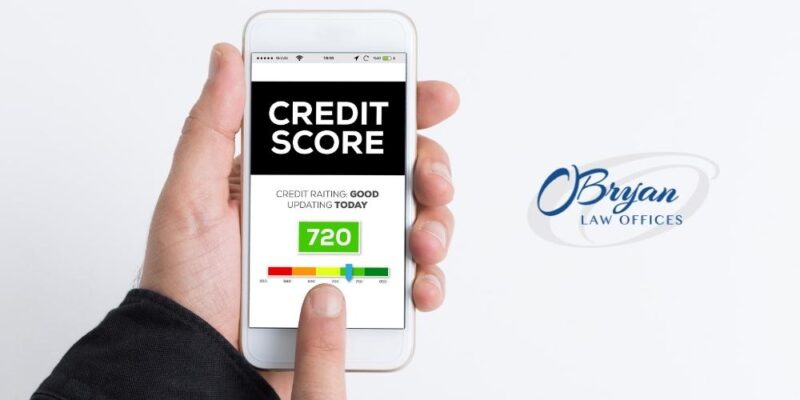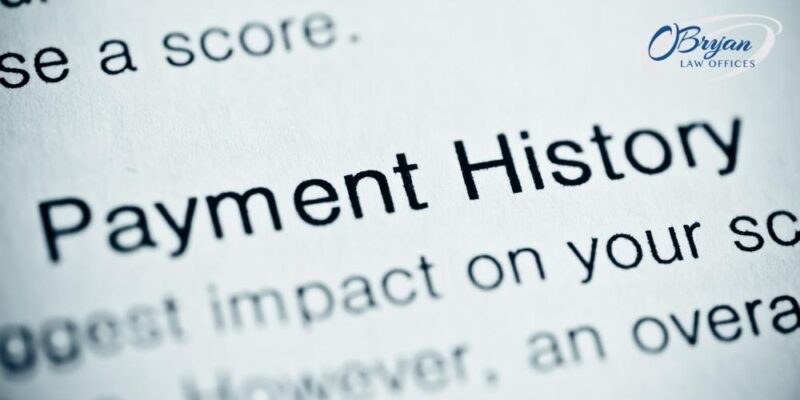700 Credit Score to 724 Credit Score


A credit score is a number that lenders use to figure out how risky you are as a borrower. Credit reports containing information about your credit history are the basis of your credit score. But, for example, is 715 a good credit score? A 715 credit score tells lenders that you’re likely to pay back borrowed money.
Having good credit is a necessity in the adult world. It means you have a higher chance of approval for a credit card or a loan. It also means you will qualify for lower interest rates and better loan terms. But if you’re struggling to keep your credit score up, O’Bryan Law Offices wants to help reorganize your finances. For more information, call us at 502-339-0222.
How Many Credit Scores Do I Have?
You don’t have just one credit score, you have multiple. This is because scores are often calculated using different scoring models, like ones from FICO and VantageScore. These models create your score based on several factors from different sources, such as the credit bureaus Equifax, Experian, and TransUnion. In reality, you actually have many different credit scores. Basically, a “good” credit score varies among lenders.
When you approach a lender about a personal loan, auto loan, or home loan, they will very likely check your credit scores. They do this to have a better idea of your creditworthiness. The higher the score, the more credit you will qualify for, and the better your loan terms will be.
FICO Score Factors
FICO ranks how important score factors are with percentages. But your actual credit score depends on your credit report. Here are FICO’s scoring factors:
- Payment history: 35%
- Amounts owed: 30%
- Length of credit history: 15%
- Credit mix: 10%
- New credit: 10%
According to FICO, anywhere from 670 to 739 is a good credit score, with 67% of Americans having a good FICO score or better.
VantageScore Factors
Meanwhile, VantageScore lists factors by how influential they are in determining your overall credit score. Once again, this will also depend on your unique credit report. Here are VantageScore’s scoring factors:
- Total credit usage, balance, and available credit: extremely influential
- Credit mix and experience: highly influential
- Payment history: moderately influential
- Age of credit history: less influential
- New accounts opened: less influential
According to VantageScore, 661 to 780 is a good credit score. VantageScore also says that 61% of Americans have a fair credit score or better.
Information That Credit Scores Don’t Consider
FICO and VantageScore don’t consider this information when calculating your credit score:
- Race, color, national origin, sex, or marital status
- Age
- Salary, occupation, title, employer, date employed, or employment history
- Where you live
- Soft inquiries, for example, when a company makes promotional credit offers. Additionally, soft inquiries happen when you check your credit report or use credit monitoring services like Experian.
700 Credit Score Through 724 Credit Score
The average credit score in the United States is 714, which falls within the 700-724 credit score range. It is firmly positioned in the “good” credit range. This means that any of the following credit scores are considered “good” credit scores and should make borrowing relatively easy.
Is 700 a Good Credit Score?
A 700 credit score is a good credit score by FICO and VantageScore. Basically, with a credit score above 700, you can be accepted for many types of loans and credit cards. But if you want approval for credit cards with the best perks, you may still need to raise your credit score. An easy way to boost your score quickly is to catch up on as many missed payments as possible, no matter how small.
Is 703 a Good Credit Score?
According to FICO and VantageScore, 703 is a good credit score. Approximately 40% of consumers have FICO scores lower than 703. If this is your credit score, you’re an “acceptable” borrower. However, 703 is still on the lower end of the “good” range, so improving it will increase your chances of approval for more loans and credit cards at more affordable lending terms.
Is 705 a Good Credit Score?
According to FICO and VantageScore, 705 is a good credit score. With a good credit score in this range, you can easily get mortgage, auto, and personal loans. Loan costs will also be fairly cheap with a 705 credit score. However, there is still room for improvement. If you want to boost your credit score quickly, remove any outstanding negative items (hard inquiries) from your report.
Is 708 a Good Credit Score?
According to FICO and VantageScore, 708 is a good credit score. In fact, 46% of consumers have scores lower than 708. But as previously mentioned, 708 is still on the lower end of the good range, and there’s room for improvement. To keep boosting that score, make sure you’re staying up to date on your payments and past-due accounts. Catching up on even one missed payment can make a big difference in your credit score in just a few days.
Is 711 a Good Credit Score?
According to FICO and VantageScore, 711 is a good credit score. With this score, you have many loan options available for a cheap price. Also, you can keep improving your credit score by removing all negative accounts like collections, charge-offs, medical bills, bankruptcies, and more.
Is 715 a Good Credit Score?
According to FICO and VantageScore, 715 is a good credit score. In fact, a 715 credit score is very close to the average credit scores of those in the United States. You can easily receive any type of loan for a cheap price. A 715 score means you likely don’t have many negative items on your credit report.
But if you do, take care of them for a quick boost. Other ways to score above 715 are to have a good credit mix and to have an aged credit account, such as a credit card that you’ve had for over two years. Additionally, getting your revolving utilization as low as possible (preferably under 30%) will give your score a boost as well.
Is 718 a Good Credit Score?
According to FICO and VantageScore, 718 is a good credit score. You can easily receive any type of loan for a cheap price. To keep improving your score, it’s important to focus on removing all collections, charge-offs, medical bills, bankruptcies, etc. Also, make sure you have at least two revolving accounts that are older than two years. You can even get added as an authorized user to a friend or family member’s credit card to keep your score rising.
Is 721 a Good Credit Score?
According to FICO and VantageScore, 721 is a good credit score. You can easily receive any type of loan for a cheap price. Once you hit the 720s, you are getting even closer to a “very good” credit score of 740 in FICO’s eyes. However, you won’t be out of the “good” range in VantageScore’s eyes until you reach 781.
Once you reach the “very good” or “exceptional” ranges, you become eligible for even better interest rates that can save you big bucks over your lifetime. To keep your score rapidly on the rise, remove any outstanding hard inquiries from your report.
Is 722 a Good Credit Score?
According to FICO and VantageScore, 722 is a good credit score. You can easily receive any type of loan for a cheap price. But to keep everything on the rise, pay your bills on time, establish a solid credit mix, and avoid high credit utilization rates.
Additionally, remember that new credit activity usually has a short-term negative impact on your credit score. This is because taking on more debt makes credit-scoring systems think you’re at a greater risk of not paying off the debts. The good news is that your score will bounce back quickly as you keep up with your bills.
Is 724 a Good Credit Score?
According to FICO and VantageScore, 724 is a good credit score. You can easily receive any type of loan for a cheap price. In fact, this score is so good that 53% of consumers have FICO scores lower than 724. But of course, there’s still room for improvement. A credit score of 724 is a mere 16 points away from being in the “very good” FICO range. To keep improving your score, it’s important to focus on removing all collections, charge-offs, medical bills, bankruptcies, etc.
What Affects Your Credit Score?
In short, the most common things that affect your credit score are:
- Payment history: Make sure all your payments are on time. Missing payments, having an account sent to collections, or filing bankruptcy hurts your credit score.
- Credit usage: If you want to keep a good credit score, it’s important to monitor which accounts have balances, how much is owed, and how much of your credit limit you’re using. Having a low debt-to-income ratio is key.
- Length of credit history: This factor considers the age of your credit accounts.
- Types of accounts: This is also called a “credit mix” and decides whether you’re managing installment accounts and revolving accounts responsibly. Installment accounts include car loans, personal loans, or mortgages. Meanwhile, revolving accounts include credit cards and other types of credit lines.
- Recent activity: This factor considers whether you’ve applied for or opened new accounts recently.
How Can Bankruptcy Increase Your Credit Score?
Basically, bankruptcy laws were enacted to relieve people and companies from creditors by allowing a fresh start. However, this fresh start comes with a high price: a major hit to your credit score. But there are still ways that bankruptcy can help your credit score in the short and long term.
Filing for bankruptcy often compares to foreclosure in that it can make your credit score plummet immediately. Usually, the higher your pre-bankruptcy score, the more it will drop post-bankruptcy. However, if you already have a low credit score, filing for bankruptcy won’t hurt it as badly.
Short-Term Positive Effects
But what are the perks of filing for bankruptcy? In some cases, you may see immediate positive results on your credit, such as:
Getting rid of “delinquent” account reports. A bankruptcy filing will essentially wipe away all your debt, including credit card debt. This is because debts that are discharged in bankruptcy can’t be reported as “delinquent.” Instead, they will be reported as discharged or included in your bankruptcy.
Improving debt-to-credit ratio. Your FICO credit score comprises around 30% of the amounts you owe on accounts. The percentage of your available credit that you’re using is a significant consideration in this research. Bankruptcy may reduce your debt-to-credit ratio because it compares outstanding debt to the amount of available credit you have.
The lesser your debt is compared to your accessible credit, the better your FICO score could be. When you file for bankruptcy, your accounts with large credit limits are usually terminated. However, if you reaffirm debts with low balances and good credit limits or open new credit accounts, your FICO score may improve. This is because you have very little outstanding debt compared to available credit limits. As a result, you’ll have a better debt-to-credit ratio.
Long-Term Positive Effects
Because filing for bankruptcy essentially gives you a clean slate, you can get your finances in order. After filing for bankruptcy, it’s important to re-establish your credit as soon as possible. This should be an easier feat because discharged debt leaves you with disposable income. As a result, you should be able to keep up with your bills. As you work to reestablish your credit, you will achieve a higher credit score over time.
Call O’Bryan Law Offices Today
At O’Bryan Law Offices, we put our significant credit and bankruptcy knowledge to work. We are not a credit repair company, but we do provide legal counsel for those struggling with debts. Whether our clients wish to file for bankruptcy to reorganize their finances or they simply need debt counseling, we can help.
A skilled Louisville bankruptcy attorney will guide you through each step of the process, ensuring that you emerge in a better financial position. Call 502-339-0222 to book a free credit consultation.








